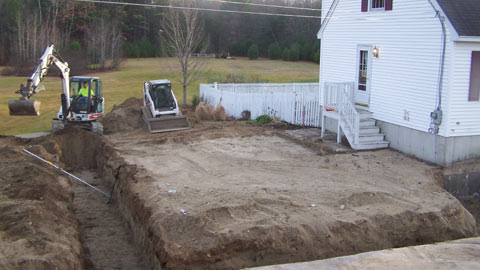Unveiling the Costs: Navigating the Average Expense of Residential Excavation
Introduction:
Embarking on a residential construction project often involves excavation – a critical step that sets the stage for a solid foundation. Understanding the average cost of a residential excavation job is essential for homeowners and contractors alike. In this blog post, we’ll explore the factors influencing excavation costs, break down the expenses involved, and provide insights to help you navigate the financial considerations associated with this foundational process. For residential excavation in Knoxville TN, contact us for a free quote!
Factors Influencing Residential Excavation Costs:
Scope of the Project: The size and complexity of the excavation project significantly impact the overall cost. Larger projects, such as basement excavations or extensive grading, require more labor, machinery, and time, leading to higher expenses.

Site Accessibility: The accessibility of the construction site plays a crucial role in determining costs. Difficult-to-reach locations may require specialized equipment or additional effort for transportation, affecting the overall excavation expenses.
Soil Conditions: The type and condition of the soil on the site influence excavation costs. Hard, rocky soil may require more powerful equipment or additional time for excavation, increasing the overall project cost.
Depth of Excavation: The depth of the excavation is a key factor. Deeper excavations necessitate more labor, equipment, and time, contributing to higher costs. Basement excavations, for example, typically incur greater expenses than shallower grading projects.
Permitting and Regulations: Local permitting requirements and regulations can add costs to a residential excavation job. Before commencing any excavation, it’s essential to factor in permit fees and ensure compliance with local regulations.
Debris Removal: The disposal of excavated material and debris impacts costs. If the soil or materials excavated need to be hauled away, disposal fees will contribute to the overall expenses.
Breaking Down the Expenses:
Labor Costs: The labor involved in excavation, including skilled operators and ground personnel, constitutes a significant portion of the expenses. Hourly rates for labor can vary based on location and the skill level required.
Equipment Costs: Excavation equipment, such as excavators, bulldozers, and loaders, incurs costs both for rental and operation. Larger or specialized equipment comes with higher rental fees, impacting the overall project budget.
Material Costs: Materials required for the excavation process, such as shoring materials, backfill materials, and any additional supplies, contribute to the overall expenses.
Permit Fees: Obtaining the necessary permits for excavation activities involves fees imposed by local authorities. These fees vary depending on the scope and nature of the project.
Disposal Fees: If the excavated material needs to be transported and disposed of off-site, disposal fees will be incurred. The distance to disposal sites and local regulations can influence these costs.
Site Preparation Costs: Site preparation before excavation, including clearing vegetation and ensuring proper access, can incur additional expenses that contribute to the overall project cost.
Average Costs Across Excavation Types:
Basement Excavation: Basement excavation tends to be more complex and costly due to the depth of excavation and potential need for structural considerations. Costs can range from $10,000 to $30,000 or more, depending on factors like size, depth, and soil conditions.
Foundation Excavation: Excavating for a foundation, which is generally shallower than basement excavation, can cost between $3,000 and $10,000, depending on the factors mentioned earlier.
Land Grading: Land grading, which involves leveling the ground for landscaping or construction, is usually less expensive. Costs can range from $500 to $5,000, depending on the size and slope of the land.
Navigating Cost-Effective Excavation:
Get Multiple Quotes: Obtain quotes from multiple excavation contractors to compare costs and services. This allows you to make an informed decision based on competitive pricing and expertise.
Clearly Define the Project Scope: Clearly articulate the scope of the excavation project to contractors. Detailed plans and specifications help contractors provide accurate quotes and minimize unexpected costs.
Consider Soil Testing: Conduct soil testing before excavation to better understand soil conditions. This information can help anticipate potential challenges and avoid surprises during the excavation process.
Optimize Site Accessibility: Ensure that the construction site is easily accessible. This reduces the time and effort required for transportation, contributing to cost savings.
Collaborate with Experienced Professionals: Partnering with experienced excavation professionals ensures that the job is done efficiently and effectively. Experienced contractors are equipped to navigate challenges, reducing the likelihood of costly setbacks.
Conclusion:
Understanding the average cost of a residential excavation job is crucial for budgeting and planning a successful construction project. The complexity of factors influencing costs underscores the importance of a well-defined project scope, collaboration with experienced professionals, and a thorough understanding of local regulations. By navigating these considerations, homeowners and contractors can embark on excavation projects with confidence, ensuring a solid foundation for the construction endeavors that follow.